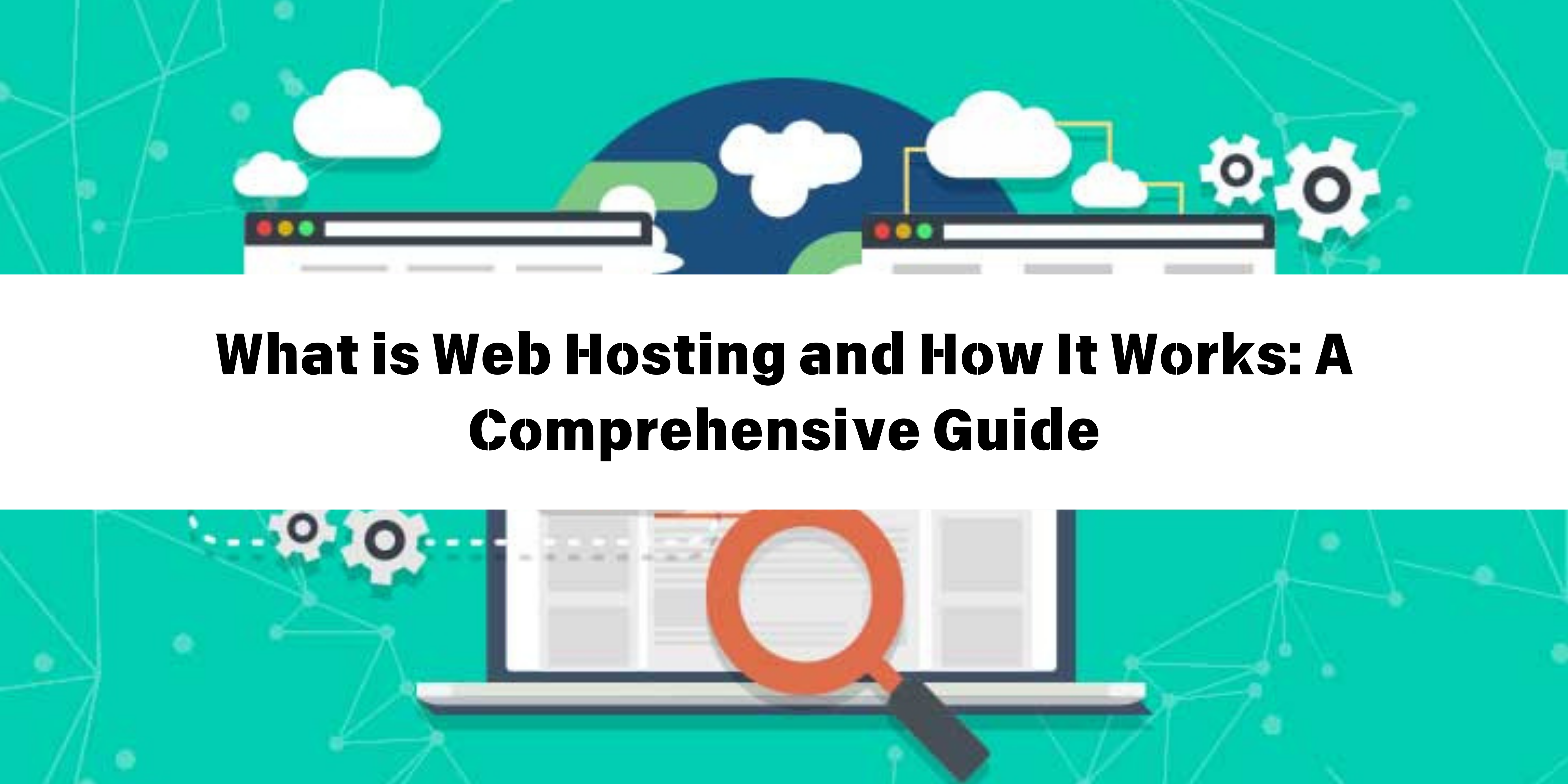
In the digital age, every business, blog, and online service relies on web hosting to ensure their website is accessible to users around the world. But what is web hosting and how does it work? Whether you’re launching your first website or seeking to understand the technical aspects of hosting, this guide will explain everything you need to know.
What is Web Hosting?
Web hosting is the service that allows individuals and organizations to store their website files on a server, making them accessible to internet users. In simple terms, web hosting enables your website to be viewed online.
- Server: A powerful computer that stores website data.
- Domain Name: A unique address that points users to your website.
- Storage: Space where website files, images, and databases are kept.
- Bandwidth: The amount of data transferred between the server and users.
When someone types your domain name (e.g., www.yoursite.com) into their browser, they are directed to the server where your website is hosted, and your site’s content is displayed.
How Does Web Hosting Work?
Now that you know what web hosting is, let’s dive into how it works. Web hosting and how it works can be broken down into the following steps:
- Website Files Stored on a Server: Your website files are uploaded to the server by your hosting provider.
- User Requests: When a user types in your domain name, their browser sends a request to the server.
- Server Response: The server then sends back the necessary files, such as HTML, CSS, images, and scripts, to load your website.
The server acts as the middleman between your website and the user, ensuring that your website’s content is accessible at all times.
Types of Web Hosting
There are several types of web hosting available, each catering to different needs. Understanding what web hosting and how it works in various contexts can help you choose the best option for your website.
1. Shared Hosting
- Definition: Multiple websites share the same server resources.
- Ideal For: Small websites or blogs with low to moderate traffic.
- Advantages: Cost-effective and easy to set up.
- Disadvantages: Limited resources can lead to slower speeds if other websites use too much bandwidth.
Data Insight: According to a survey by W3Techs, over 60% of websites use shared hosting, making it the most popular option due to its affordability. However, this may not be ideal for websites that experience high traffic volumes.
2. VPS Hosting
- Definition: Virtual Private Server hosting divides a physical server into multiple virtual servers.
- Ideal For: Websites that need more control and resources without the cost of a dedicated server.
- Advantages: More power, customization, and control than shared hosting.
- Disadvantages: Slightly higher cost.
Data Insight: A report from Statista shows that VPS hosting accounts for nearly 20% of all hosting market share, showing increasing demand for flexible, scalable hosting solutions.
3. Dedicated Hosting
- Definition: A single website uses an entire server.
- Ideal For: Large websites with heavy traffic.
- Advantages: Maximum resources, performance, and security.
- Disadvantages: High cost and requires technical expertise.
Data Insight: Businesses with high-traffic websites experience up to 5x faster load times on dedicated hosting servers, according to a report from Web Hosting Talk. This improved performance is essential for user retention and SEO.
4. Cloud Hosting
- Definition: Hosting on multiple servers, often in different locations.
- Ideal For: Websites with fluctuating traffic.
- Advantages: Scalable, flexible, and highly reliable.
- Disadvantages: May have unpredictable pricing.
Data Insight: Gartner predicts that by 2025, over 80% of organizations will use cloud-based hosting solutions for their websites due to its scalability and flexibility.
5. Managed WordPress Hosting
- Definition: Optimized for WordPress websites, with features like automatic backups and security.
- Ideal For: WordPress users looking for a hassle-free experience.
- Advantages: Automatic updates and maintenance.
- Disadvantages: Limited flexibility if you need to use other technologies.
Why Is Web Hosting Important for Your Website?
What web hosting and how it works can greatly impact your website’s performance. Here’s why choosing the right hosting is essential:
- Uptime: The amount of time your website is online. A reliable host ensures a high uptime rate (99.9% or above).
- Speed: Faster load times lead to better user experience and improved SEO rankings.
- Security: Hosting with strong security features protects your website from cyber threats.
- Support: Responsive customer support can help you resolve issues quickly.
Data Insight: Studies have shown that a 1-second delay in page load time can result in a 7% loss in conversions and a 16% decrease in customer satisfaction. This makes choosing the right host with fast loading speeds crucial for business success.
Factors to Consider When Choosing Web Hosting
When deciding what web hosting and how it works for your needs, consider these essential factors:
1. Uptime Guarantee
- Ensure your hosting provider offers at least 99.9% uptime.
- Frequent downtime can negatively affect your SEO rankings and user experience.
Data Insight: Google uses uptime as one of its ranking factors. Websites that experience downtime may see a 10-20% drop in search engine rankings.
2. Customer Support
- 24/7 customer support is essential for resolving issues that may arise.
- Look for providers offering multiple support channels (live chat, phone, and email).
3. Storage and Bandwidth
- Determine how much space you need based on your website’s size and type.
- Websites with media-heavy content (images, videos, etc.) require more storage and bandwidth.
4. Security Features
- Look for SSL certificates, firewalls, malware protection, and backups.
- These features help protect both your website and your users.
5. Pricing and Scalability
- Ensure the hosting plan fits within your budget.
- Choose a host that offers scalability, so you can upgrade your plan as your website grows.
The Role of Web Hosting in SEO
Understanding what web hosting and how it works also involves recognizing its impact on SEO. Here’s how web hosting affects your search engine ranking:
- Site Speed: Faster loading times improve user experience and are a key ranking factor.
- Uptime: Reliable hosting ensures your site is always accessible, improving SEO performance.
- SSL Certification: Google gives preference to sites with SSL encryption (HTTPS).
- Server Location: Hosting in locations close to your target audience helps improve load times and local SEO.
Data Insight: According to Moz, site speed is one of the top 5 ranking factors for Google, influencing both your user experience and search engine performance.
Common Web Hosting Mistakes to Avoid
When selecting a hosting provider, avoid these common mistakes to ensure what web hosting and how it works benefits your website:
1. Overlooking Customer Support
- Choose a provider with responsive customer service to avoid delays in resolving issues.
2. Choosing the Cheapest Option
- While budget-friendly plans are tempting, they may lack essential features and performance.
- Invest in a hosting plan that provides the best value for your needs.
3. Ignoring Backup Features
- Regular backups ensure that your website’s data is safe in case of technical issues or cyber-attacks.
4. Not Considering Future Growth
- Opt for hosting plans that offer scalability, so you can grow your website without performance issues.
How to Transfer Your Website to a New Host
If you’re not satisfied with your current hosting provider, you might need to transfer to a new one. Here’s how to do it:
- Backup Your Website: Ensure all files, databases, and emails are backed up.
- Choose a New Host: Select a hosting plan that suits your website’s needs.
- Update DNS Settings: Point your domain to the new server by updating DNS records.
- Test the Website: Before making the switch live, test your site on the new host to ensure everything works.
- Monitor Performance: After the transfer, keep an eye on website speed, uptime, and security.
Emerging Trends in Web Hosting
What web hosting and how it works is evolving to meet modern demands:
- Green Hosting: Hosting services are now powered by renewable energy.
- Cloud-Based Solutions: Highly flexible and scalable, cloud hosting is becoming more popular.
- AI-Powered Hosting: Artificial intelligence enhances website optimization and security.
- Edge Computing: Reduces latency by processing data closer to the user.
Data Insight: According to Forrester, 30% of enterprises are expected to rely on AI-powered hosting solutions by 2026, demonstrating a significant shift toward automation and optimization in web hosting.
Conclusion
In summary, understanding what web hosting and how it works is crucial for running a successful website. Choosing the right hosting provider not only affects your website’s performance but also influences SEO, security, and user experience. Whether you’re just starting out or looking to upgrade, understanding the different types of hosting and how they work can help you make an informed decision that supports your website’s growth and success.






